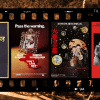The whimsical storytelling of video games

What if we could put ourselves directly into the stories we read on paper? Creators have been looking to make the experience of consuming stories more immersive for quite some time now. One example of this can be comics where writers and artists come together to provide the readers with a visual account of the story. Another example is cinema, making things even more personal through the use of visuals and audio. But, for those of us in the audience looking to participate in the narrative itself, video games have proven time and again to provide us with maximum immersion, letting us virtually participate in a creatively fabricated world of narrative and adventure.
Since Donkey Kong, the first ever game with a storyline, was released in 1981, there has been a significant shift in the gaming industry with story-based games. As literary modernism ventured to connect readers to the narrative, with writers like Dostoevsky writing in his dialogic writing style to involve the readers to provoke thoughts and ideas, video games were also made to enhance the participation of the audience in narratives driven entirely by themselves. It is truly remarkable how swiftly the industrial sector dominated the global landscape in such a brief span of time. Video games have improved through the notion of storytelling since the concept started to get popular around the 1980s and 1990s, and started to emerge as a sophisticated and futuristic literary medium.
Creating a video game, especially one that is storyline-based or an open-world role-playing game, is like creating an entirely new universe. And in doing so, a lot of effort is put into bringing forth a story from its concept to a playable space. This requires several teams and departments; alongside artists, designers, software engineers, and many others involved in game development, storytellers play a very significant role as their skills are used to build characters and an immersive world with lore, history, and geography.
After playing and learning about a variety of games, I can draw a parallel between the essence of the human world and the styles of literary fiction I grew up reading. While reading fiction, readers put themselves in the shoes of the protagonists and characters they read about. Video games help us realise this concept of being able to be the characters fully with first person or third person points of view, turning imagination into a version of reality that we can see and control. Readers can submerge themselves into the visual and auditory experience, the notion of challenges and rewards, and the overall interactivity lying within the appealing stories.
The question then arises: What are a few ways in which the experience of reading a book or watching a movie might differ from that of a game? If we were to take Hogwarts Legacy as an example, the game stands apart from the books and movies by allowing the players to actively use magic, fly on a broomstick, and cast forbidden spells like Avada Kedavra with consequences. This means that players do not necessarily have to follow Harry's footsteps, but can rather they experience the narrative on their own. Video games offer us the chance to exercise free will (to some extent) within the setting of a fantastical world.
Another fascinating use of video games is the recreation of history, letting players witness the past in a way that otherwise might not have been possible. Video games like Assassin's Creed Mirage or Assassin's Creed Origins are based on historical storylines from which players can see an almost precise recreation of Egypt or 9th century Baghdad, which can be a surreal experience for fans of historical fiction and architecture. Readers of The House of Wisdom or Mara: Daughter of the Nile can explore the very worlds that characters explore in the pages of a book and become playable and exploreable as video game characters. One can see the old architecture, culture, and lifestyles of people through this. To maintain accuracy and authenticity, researchers, developers, and scriptwriters spend hours developing these games to be as historically accurate as they can be.
Some games require a lot of reading as well. An example of this is Genshin Impact, where one needs to read through its vast storyline, conversations, and narrations. Creating a video game bridges the gap between the worlds of STEM and the humanities as well. The amount of scientific exploration and technical effort needed to build a fully functioning game is equivalent to the historical, anthropological, and literary research that is needed to base the game functions upon a captivating and believable storyline. The Ghost of Tsushima, released in 2020, is a game based on the Mongol invasion in Japan. It introduced me to the Samurai history of 13th century Japan with amazing storytelling and imagery.
A deep parallel between literature and video games is that both need the player to fully immerse themselves as characters in a story. The combination of visuals, sound, and stimulation presents a singular chance to inhabit stories as well as absorb them, converting amusement into an enlightening and historically significant experience. In video games, players can actively engage with the narrative, shaping their journey and experiencing it firsthand. This interactive component mimics the immersive quality of books, allowing readers to identify with characters and follow their development over the course of a narrative. Playing these video games has the positive potential of affecting personal development such as decision making, problem solving and adaptive skills.
The world is changing and with the increasing availability of consoles and personal computers, and so are the methods of consuming content. Virtual Reality (VR) is a significant addition in this transformation, offering stimulating experiences that enhance storytelling in ways which mean that literature no longer needs to be imagined but can be lived as first-person simulations. The appeal of reading pages after pages and visualising the narration in their own heads will remain intact among readers, but the lucrative chance of exploring the imaginary world with audiovisual cues can attract many literature fans towards the wonderful world of video games.
Dola Saha, a fresh literature graduate, reads, writes and daydreams about being a poet. Greet her at [email protected]
Saif Mahmood, a teaching assistant at BRAC University and a literature graduate, constantly panics and overthinks about his academic career. Reach him at [email protected]

 For all latest news, follow The Daily Star's Google News channel.
For all latest news, follow The Daily Star's Google News channel. 








Comments